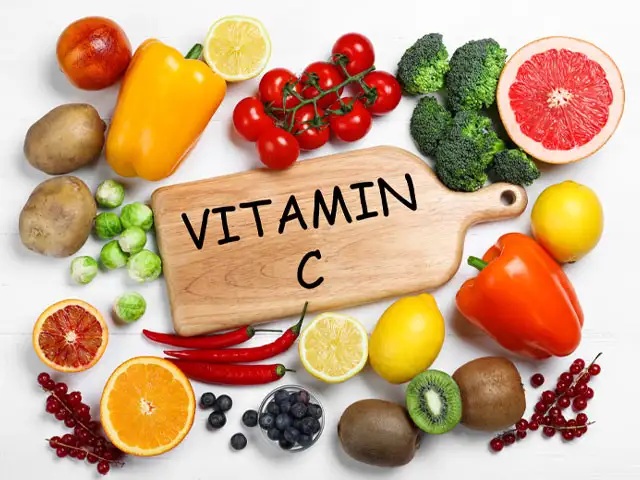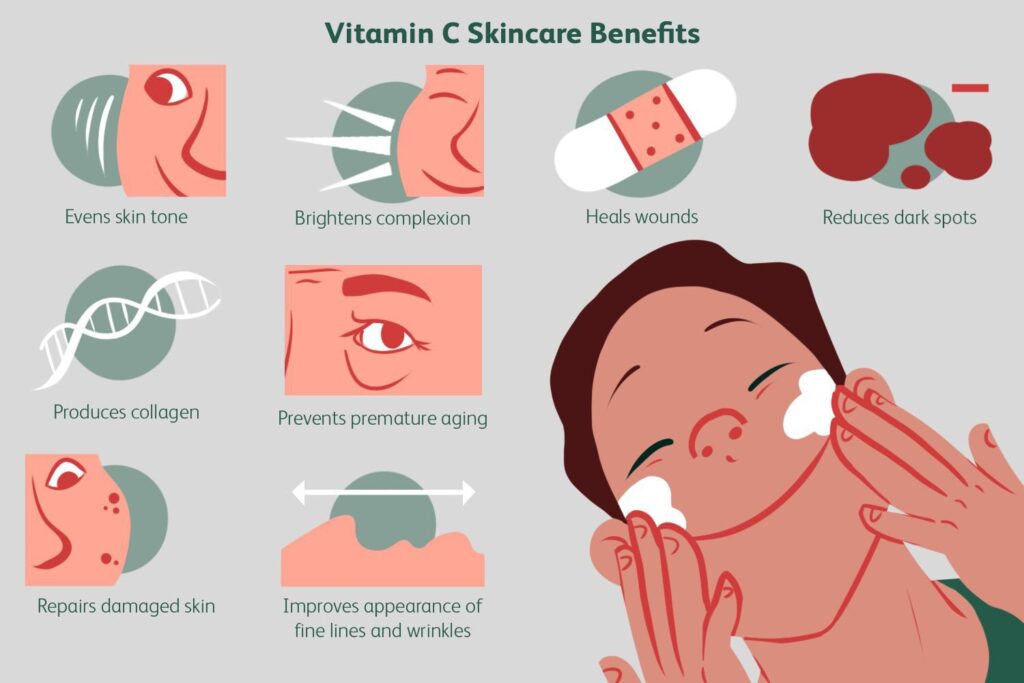Vitamin C is everywhere—in your citrus fruits, your immune-boosting supplements, and even your skincare.
Known for its powerful antioxidant punch and skin-brightening benefits, Vitamin C is essential for looking and feeling your best. But what does it really do in the body, and are you getting enough?
From health benefits to smart tips on daily intake, this guide covers everything you need to know about this powerhouse vitamin.
Key Notes
- Vitamin C boosts collagen, brightens skin, and shields cells from free radical damage.
- Smokers need an extra 35 mg of Vitamin C daily for optimal health.
- Heat and light can destroy Vitamin C in foods—quick cooking preserves it best.
- Too much Vitamin C can lead to digestive issues and increase kidney stone risk.
- Topical Vitamin C fades dark spots and protects skin, especially when paired with sunscreen.

What is Vitamin C?
Vitamin C, also known as ascorbic acid, is a water-soluble vitamin found in various foods and supplements. Because it’s water-soluble, your body doesn’t store it long-term, so you need to get it regularly through food or supplements. Vitamin C is essential for several bodily functions, including collagen production, immune support, and iron absorption.
As an antioxidant, Vitamin C also plays a crucial role in protecting cells from damage caused by free radicals, which can accumulate from environmental sources like pollution, smoke, and UV rays. By neutralizing these harmful molecules, Vitamin C helps keep your cells and tissues healthier for longer.
Health Benefits of Vitamin C
The benefits of Vitamin C go far beyond supporting immunity. Here are some of its major health benefits:
Immune System Support
Vitamin C is well-known for supporting immune health. It stimulates the activity of white blood cells, which are vital for fighting infections. Many people increase their intake during cold and flu season, and while it may not prevent a cold, Vitamin C can potentially shorten the duration and lessen the severity of symptoms.
Antioxidant Properties
Vitamin C’s antioxidant power helps protect cells from oxidative stress, which can lead to premature aging and various health issues over time. Antioxidants help keep the body’s cells functioning properly and can even reduce inflammation, which is linked to a wide range of chronic illnesses.
Skin Health
Vitamin C is essential for collagen production, making it one of the best nutrients for supporting healthy skin. Collagen is a protein that provides structure and elasticity to the skin, keeping it firm and reducing the appearance of fine lines and wrinkles. As an antioxidant, Vitamin C also fights damage from UV rays and environmental pollutants, helping the skin maintain its youthful glow.
Heart Health
Research suggests that Vitamin C may help reduce the risk of heart disease. It can contribute to lower blood pressure and may also reduce LDL (bad) cholesterol and triglycerides. However, it’s still best to view Vitamin C as part of a heart-healthy diet rather than as a primary treatment for cardiovascular health.
Other Potential Benefits
Scientists are studying Vitamin C’s possible benefits in various other areas, such as eye health and cancer support. While research is still emerging, Vitamin C might help slow age-related macular degeneration (AMD) and reduce the risk of cataracts. In cancer research, high doses of Vitamin C are sometimes used alongside conventional treatments, though the evidence is still evolving.

Recommended Daily Intake
The recommended daily intake for Vitamin C varies by age and gender. For adults, the general guidelines are:
- Men: 90 mg per day
- Women: 75 mg per day
- Pregnant Women: 85 mg per day
- Breastfeeding Women: 120 mg per day
Smokers require an additional 35 mg daily, as smoking depletes Vitamin C levels in the body. The upper limit for daily intake is 2,000 mg, and going over this can cause side effects like stomach cramps and kidney stones in some cases.
If you’re unsure of your exact needs, consider consulting with a healthcare provider to tailor the dosage based on your lifestyle and health conditions.
Signs of Vitamin C Deficiency
Vitamin C deficiency is rare in most developed countries but can occur in cases where diet lacks fruits and vegetables for prolonged periods. Early symptoms may include fatigue, gum inflammation, and slow wound healing. Severe deficiency leads to scurvy, which causes joint pain, bleeding gums, and even tooth loss due to weakened collagen in connective tissues.
Those most at risk include individuals with restricted diets, heavy smokers, or those with certain health conditions that hinder nutrient absorption. Fortunately, even mild doses of Vitamin C can prevent scurvy and keep the body functioning well.
Sources of Vitamin C
To ensure you’re getting enough Vitamin C, incorporate a variety of rich sources into your diet. Here are some of the best options:
- Citrus Fruits: Oranges, grapefruits, lemons, and limes are all excellent sources.
- Berries: Strawberries, raspberries, and blackberries offer high Vitamin C content with antioxidants.
- Bell Peppers: Surprisingly, red and green peppers contain more Vitamin C per serving than citrus.
- Cruciferous Vegetables: Broccoli, Brussels sprouts, and cabbage provide both fiber and Vitamin C.
- Kiwi and Papaya: These tropical fruits are nutrient-dense and loaded with Vitamin C.
- Potatoes: White potatoes contain small amounts of Vitamin C, especially if you eat the skin.
Eating a variety of fruits and vegetables is the best way to meet your Vitamin C needs. The nutrient is also available in supplements, though for most people, food sources are preferable as they provide additional nutrients and fiber.
Vitamin C in Skin Care
Beyond dietary intake, Vitamin C has gained popularity as a skincare ingredient. In topical form, it helps brighten skin, reduce pigmentation, and support collagen production. Here’s what you need to know about using Vitamin C in your skincare routine:
- Benefits: Topical Vitamin C can help fade dark spots and improve skin texture. It also provides a layer of protection against sun damage when combined with sunscreen.
- Choosing a Product: Look for products with 10-20% Vitamin C concentration for effectiveness. Serums tend to be the most potent, while creams and lotions may contain lower concentrations.
- Application Tips: Apply Vitamin C to clean, dry skin before moisturizing. Pair it with sunscreen during the day for enhanced UV protection.
Keep in mind that Vitamin C can be sensitive to light and air, so look for products in opaque, airtight packaging to maintain their potency.

How to Preserve Vitamin C in Food
Vitamin C is sensitive to heat, light, and air, so cooking methods can affect its levels in food. Here are some tips for preserving Vitamin C in your meals:
- Cook Quickly: Methods like steaming, blanching, and microwaving reduce Vitamin C loss compared to boiling.
- Use Minimal Water: When boiling, use as little water as possible and try to reuse any cooking water in soups or sauces.
- Avoid Prolonged Storage: Vitamin C levels can decrease over time, so eat fresh produce promptly and store it in a cool, dark place.
Incorporating raw sources like salads, fruit bowls, or smoothies is another way to maximize your intake without compromising on nutrients.
FAQs
Does Vitamin C affect mental health or mood?
Yes, Vitamin C plays a role in synthesizing neurotransmitters like dopamine, which can influence mood. Some studies suggest that low Vitamin C levels may be linked to feelings of fatigue and depression.
Can Vitamin C help with exercise recovery?
Vitamin C’s antioxidant properties may help reduce muscle soreness and speed up recovery after intense workouts by neutralizing free radicals produced during exercise.
Is it possible to be allergic to Vitamin C supplements?
Although rare, some people may react to additives or fillers in Vitamin C supplements, not the vitamin itself. Symptoms can include rash, stomach discomfort, or headaches.
Does Vitamin C interact with medications?
Yes, Vitamin C can affect the absorption of certain drugs, like statins and blood thinners. Consult a healthcare provider if you’re on medication and considering high-dose Vitamin C supplements.
Can Vitamin C prevent iron deficiency?
Vitamin C enhances the absorption of non-heme iron from plant foods, which can be especially helpful for people with iron-deficiency anemia when included in meals.
How stable is Vitamin C in juices and smoothies?
Vitamin C starts degrading once exposed to air and light. Freshly made juice or smoothies retain the most Vitamin C, but levels drop if they sit for hours, especially at room temperature.
Conclusion
Vitamin C is a versatile nutrient with a range of benefits, from immune support to skin health. Whether you’re looking to boost your intake for a strong immune system or improve your skin’s appearance, Vitamin C can be an excellent addition to both your diet and skincare routine.
Eating a diet rich in fruits and vegetables is the most effective way to meet your daily needs, and if you need a little extra, supplements can offer a reliable boost.
Connect with your local Willa Krause consultant to maximize your serum’s benefits and revive your glow!


